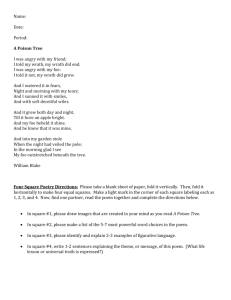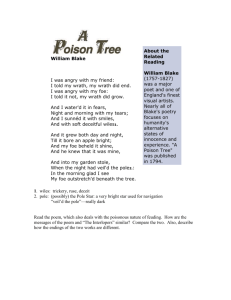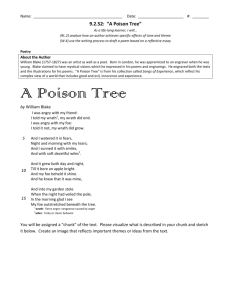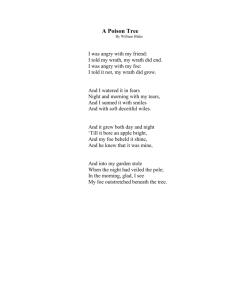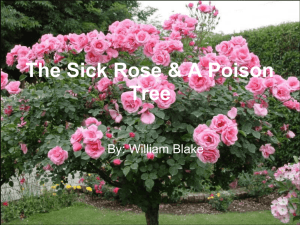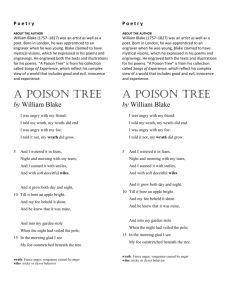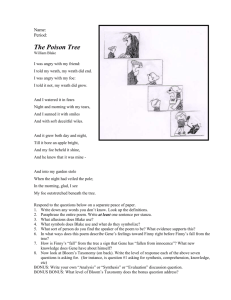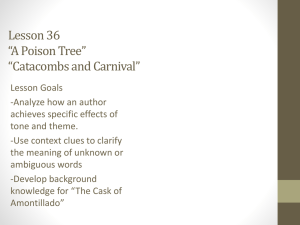(1) - Cloudfront.net
advertisement
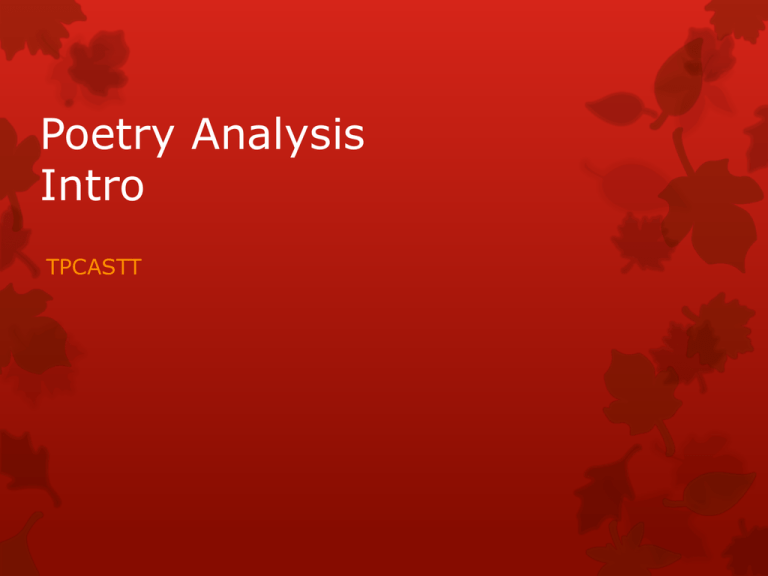
Poetry Analysis Intro TPCASTT Introduction to Poetry Billy Collins I ask them to take a poem and hold it up to the light like a color slide or press an ear against its hive. I say drop a mouse into a poem and watch him probe his way out, or walk inside the poem's room and feel the walls for a light switch. I want them to waterski across the surface of a poem waving at the author's name on the shore. But all they want to do is tie the poem to a chair with rope and torture a confession out of it. They begin beating it with a hose to find out what it really means. Poetry Terms Imagery: Anything that appeals to the five senses. Sight, Sound, Taste, Touch, Smell Simile: A comparison of two things using the words like or as. Her hair was black like the feathers of a crow in winter. Metaphor: A comparison of two unlike things without using the words like or as. Her hair was the black feathers of a crow in winter. Personification: Giving nonhuman things human characteristics. The tree danced with the grace of a ballerina in the wind Symbol: When an ordinary object stands for something beyond itself. A flag is just a piece of cloth but it represents a country’s individuality. Rhythm: A repetition of sound paterns Ba duh, ba duh, ba duh, ba duh Meter: The pattern of stressed and unstressed syllables. TPCASTT Title: Ponder the title before reading the poem Paraphrase: Translate the poem into your own words Connotation: Look at the poet’s word choice; find one or two words that seem odd/different/interesting. Ask yourself: Why did the poet choose that word? What does it convey? How would a different word affect the mood/tone/message of the poem? Attitude: Identify what the poem is about and then explain how you are supposed to feel about that thing Shifts: Note shifts in speaker, message, and/or attitude Title: Examine the title again, this on an interpretive level (now that you understand more about the poem) Theme: Determine what thematic message the poet is conveying Practice A Poison Tree – William Blake Look at the title and attempt to predict what the poem will be about. A Poison Tree – William Blake I was angry with my friend: I told my wrath, my wrath did end. I was angry with my foe: I told it not, my wrath did grow. And I watered it in fears Night and morning with my tears, And I sunned it with smiles And with soft deceitful wiles. And it grew both day and night, Till it bore an apple bright, And my foe beheld it shine, And he knew that it was mine And into my garden stole When the night had veiled the pole; In the morning, glad, I see My foe outstretched beneath the tree. Paraphrase the literal meaning or “plot” of the poem. A true understanding of the poem must evolve from comprehension of “what’s going on in the poem.” A Poison Tree – William Blake I was angry with my friend: I told my wrath, my wrath did end. I was angry with my foe: I told it not, my wrath did grow. And I watered it in fears Night and morning with my tears, And I sunned it with smiles And with soft deceitful wiles. And it grew both day and night, Till it bore an apple bright, And my foe beheld it shine, And he knew that it was mine And into my garden stole When the night had veiled the pole; In the morning, glad, I see My foe outstretched beneath the tree. For poetry, connotation indicates that students should examine any and all poetic devices, focusing on how such devices contribute to the meaning, the effect, or both of a poem. Students may consider imagery (especially simile, metaphor, personification), symbolism, diction, point of view, and sound devices (alliteration, onomatopoeia, rhythm, and rhyme). A Poison Tree – William Blake I was angry with my friend: I told my wrath, my wrath did end. I was angry with my foe: I told it not, my wrath did grow. And I watered it in fears Night and morning with my tears, And I sunned it with smiles And with soft deceitful wiles. And it grew both day and night, Till it bore an apple bright, And my foe beheld it shine, And he knew that it was mine And into my garden stole When the night had veiled the pole; In the morning, glad, I see My foe outstretched beneath the tree. Having examined the poem’s devices and clues closely, you are ready to explore the multiple attitudes that may be present in the poem. A Poison Tree – William Blake I was angry with my friend: I told my wrath, my wrath did end. I was angry with my foe: I told it not, my wrath did grow. And I watered it in fears Night and morning with my tears, And I sunned it with smiles And with soft deceitful wiles. And it grew both day and night, Till it bore an apple bright, And my foe beheld it shine, And he knew that it was mine And into my garden stole When the night had veiled the pole; In the morning, glad, I see My foe outstretched beneath the tree. Rarely does a poet begin and end the poetic experience in the same place. Discovery of a poet’s understanding of an experience is critical to the understanding of a poem. Trace the feelings of the speaker from the beginning to the end, paying particular attention to the conclusion. Look for the following to find shifts: 1. Key words (but, yet, however, although) 2. Punctuation (dashes, periods, colons, ellipsis) 3. Stanza division 4. Changes in line or stanza length or both 5. Irony (sometimes irony hides shifts) 6. Effect of structure on meaning 7. Changes in sound (rhyme) may indicate changes in meaning 8. Changes in diction (slang to formal language) A Poison Tree – William Blake Examine the title again, this time on an interpretive level. A Poison Tree – William Blake I was angry with my friend: I told my wrath, my wrath did end. I was angry with my foe: I told it not, my wrath did grow. And I watered it in fears Night and morning with my tears, And I sunned it with smiles And with soft deceitful wiles. And it grew both day and night, Till it bore an apple bright, And my foe beheld it shine, And he knew that it was mine And into my garden stole When the night had veiled the pole; In the morning, glad, I see My foe outstretched beneath the tree. Identify the theme by recognizing the human experience, motivation, or condition suggested by the poem. Remember: Theme is always a STATEMENT, not a single word, and not a cliché. Practice on a poem of choice (Thematic connection to P&P) The Garden of Love (Diyanni 936) The Ruined Maid (Diyanni 947) Complete a TPCASTT. Complete a TPCASTT. Decide why the garden changes. Decide which it is better to be. What did you learn about the period? What did you learn about the period?
